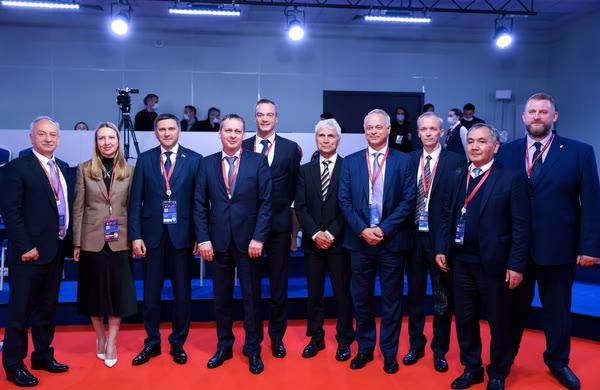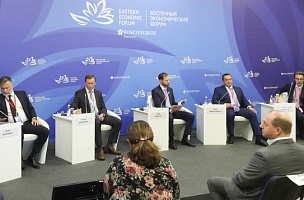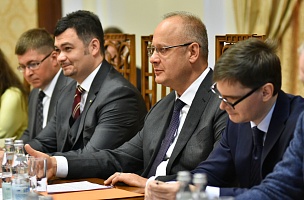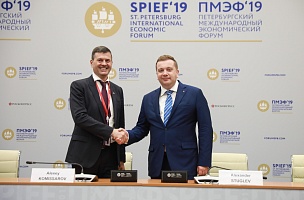Key conclusions
The planet’s population is growing, but the volume of water is not, which could lead to adverse consequences
“We are truly going through global climate change – droughts, floods, typhoons, rainstorms. They reflect the dynamics of the planet’s water balance as a whole. And, of course, the growing man-made impact. Given that access to water resources is one of the key factors for socioeconomic development, we are seeing that many countries are already experiencing a shortage of drinking water. The condition of [water] sources is deteriorating as the population grows. And the water utilization system needs to be modernized through the introduction of new regulatory approaches, technological modernization, and digitalization, including the use of new financial solutions,” said Ilya Razbash, Director of the Information and Analysis Center for the Development of the Water Management Complex.
“Humans, of course, need to monitor what they are doing with the Earth’s water resources. This is one of the main tasks for us. This must be taught from a very young age [...] Our generation was taught this, yet we still began to turn a blind eye to water because there is a lot of it. Because we see that we have enough water in Russia, although there are more and more water-deficient regions every year [...] Overall, we are not getting more water on Earth. The circulation from the school curriculum tells us about this. The number of people on Earth is increasing, and this is the main threat to the ecological intricacies on planet Earth,” said Dmitry Kobylkin, Chairman of the State Duma’s Committee on Ecology, Natural Resources and Environmental Protection.
“It’s hard to imagine our modern society without water, both in terms of everyday human needs and in terms of economic activity [...] This is a crucial issue, but we must understand that fresh water and drinking water make up only about one percent of the total reserves around the world. And this is an extremely fragile resource that requires the proper treatment – conservation and protection, including in terms of quality,” said Dmitriy Kirillov, Head of the Federal Water Resources Agency.
It's not only the quantity, but the quality of water that is front and centre
“Imagine a 4.5-kilometre long rope. Let’s say that this is 4.5 billion years [the age of the planet – Ed.]. And only a small piece of this rope is the time in which we managed to pollute our water. Do you know what the length is? Just one hundredth of a millimetre. That’s 10 microns. And over these 10 microns out of 4.5 kilometres, we managed to spoil all our water on the planet,” Russian Academy of Sciences Vice-President Yuriy Balega said.
“As for water conservation, it is entirely clear that the main issue now is the quality of our reservoirs and our rivers around the world. The quality component is what makes this water suitable for further use, for drinking, and so on. For maintaining biodiversity,” said Dmitriy Kirillov, Head of the Federal Water Resources Agency.
“Today, we are seeing that this is not an abstract issue. For many countries it is a key one: it involves international cooperation in the sustainable use and conservation of water resources,” said Dmitriy Kirillov, Head of the Federal Water Resources Agency.
PROBLEMS
Creating favourable conditions with water resources in one place can threaten neighbouring areas
“Microplastics exist in water. This is a problem. It is obvious. We know that plastic islands are already forming in the ocean. Certain changes are taking place in the oceans that we have yet to talk about and prove to our science [...] We are seeing ice melt in the Arctic. This is a truly serious significant factor that we cannot ignore. The ice is getting thinner. Perhaps this is some sort of temporary factor. Maybe this is how planet Earth is evolving [...] water can live without humanity, but people cannot live without water. So we need everyone at their own level to take maximum care of water in order to preserve it for future generations,” said Dmitry Kobylkin, Chairman of the State Duma’s Committee on Ecology, Natural Resources and Environmental Protection.
“It is crucial that we understand that in our country, one of the richest countries in the world in terms of water resources [...], pollution is on the rise. Of course, this is above all industry, it’s agriculture. But it also includes household items and a lack of treatment facilities. Even in the village where I worked, the treatment facilities were built back in the late 1960s. It’s all fallen apart. There is nothing there. And you won’t get a penny anywhere to fix them. All the drains go directly to the rivers. So the topic of clean water and fresh water for the planet should start from something small – with cleanliness in our homes and saving water in the household,” Russian Academy of Sciences Vice-President Yuriy Balega said.
“I would like to say something about Arkhyz [resort]. It’s just a small illustration of our greater life. On the one hand, we have created a modern resort there, and the resort has indeed been provided with infrastructure, including treatment facilities. But we haven’t done anything and aren’t doing anything about the village that has historically developed there. And we are truly seeing what we are observing in terms of the pollution of our rivers,” said Dmitriy Kirillov, Head of the Federal Water Resources Agency.
The global environmental problem today is more about water than about gases
“Scientists love horror stories, but the main problem facing the planet’s climate, the main greenhouse gas, is not methane, although the greenhouse effect from it is strong, of course, or CO2 – carbon dioxide. The main thing is water vapour. Ordinary water vapour accounts for 80% of the contribution to the warming of the atmosphere. That’s why we have such a closed cycle: there is more water vapour in the atmosphere, and the atmosphere is becoming warmer. It’s getting warmer – it can absorb more water. This is why the climate is changing. The wetter the atmosphere, the more catastrophic processes and hurricanes we have. The contrasts are growing strongly [...] So, oddly enough, there is already more and more fresh water in a free state because the glaciers of Greenland, Antarctica, and the Arctic are melting,” Russian Academy of Sciences Vice-President Yuriy Balega said.
The next generations may face serious problems due to ocean pollution
“The ocean is an enormous source of resources, but it is also a huge sewer. I mentioned that we have polluted fresh water bodies in literally just 50–100 years, and in another 50 years, we will pollute all our oceans and seas. And the planet will turn into a fetid cesspool. We talk a lot, but we invest very little. There are even fewer technical means that could remedy the situation. So the threat is serious. Speaking very seriously, the next two or three generations will face this problem for real. And there may not only be intergovernmental conflicts, but there could be a global conflict overall. So water must be taken seriously,” Russian Academy of Sciences Vice-President Yuriy Balega said.
SOLUTIONS
Wastewater treatment plants at production facilities not only eliminate waste, but help to breed fauna
“Our plant could be described as an example of a caring attitude for the environment and water resources. First, it uses the most modern technologies and is designed based on the principle of waste-free production, i.e., a bioreactor with membrane filters is used to treat wastewater. Consequently, the polluted water becomes clean downstream, accumulates in special reservoirs, and we breed mirror carps there. So this is the plant’s whole system. These technologies allow the plant to minimize the load on the surrounding water basin,” Aquanika Chief Executive Officer Elena Postol said.
Common sense could help save the environment
“We have started to save Baikal. The whole world came down on us when they realized that the situation there was serious, and made Baikal a rallying cry. We allowed [companies] to dump practically distilled water into Baikal. Not a single production facility or a single household could attain the level of such a discharge because it simply does not exist in principle [...] Some sort of common sense is needed in everything. We need to stop in time. Or is it better to prevent something than to continue carrying out irreversible processes on planet Earth,” said Dmitry Kobylkin, Chairman of the State Duma’s Committee on Ecology, Natural Resources and Environmental Protection.
Environmental issues should become part of everyday culture and education
“We thought a lot about how to not make the environmental lesson an optional one or based on the principle of ‘let’s find time for ecology in our already busy schedule and in our children’s packed [schedule]’. And we haven’t found any time there. There’s no forty five minutes. Our children are completely engrossed in the educational process. And how can immerse them in a constant lesson for 45 minutes. We have things to tell and warn children about. I would have already done this back in kindergarten, but we cannot do it in schools. We racked our brains [...] and concluded that this can be done without changing the student process. We have mathematics and physics. We have tasks that are drawn up and designed by a certain institute that is located in the Russian Federation. In textbooks, kids need to be immersed in problems with the environmental theme from the first grade to the eleventh grade so that children already understand their responsibility there when solving certain problems and certain equations,” said Dmitry Kobylkin, Chairman of the State Duma’s Committee on Ecology, Natural Resources and Environmental Protection.
“It all comes from us, from our attitude to a particular thing. To the extent that we acknowledge it. If something becomes important for a person and it is scaled from a person to society and to public demand, then it already transforms into the behaviour of both industrial enterprises and state policy – in any state, in our state, in a neighbouring state, in a foreign state, and so on,” said Dmitriy Kirillov, Head of the Federal Water Resources Agency.
Monitoring and water resource protection areas could improve the environmental situation
“Water is part of the bigger problem of protecting our planet’s nature. And if, for example, special air protection areas are being created to check the carbon balance – how much carbon is emitted and how much is absorbed by plants, swamps, water, and so on – [...], it would be great to create such sites for the protection of water resources,” Russian Academy of Sciences Vice-President Yuriy Balega said.
“As for microplastics, I fully agree that we at least need, let’s say, an academic, scientific unified base for monitoring and analysis. Then there will be other issues on the agenda, such as where are the treatment facilities that are capable of cleaning everything or not? And when will we attain this technological level? But we already have at least one question right now from the standpoint of the circulation of municipal waste, so that this plastic does not find its way into water bodies at all,” said Dmitriy Kirillov, Head of the Federal Water Resources Agency.
“Today, despite the entire aggressive backdrop that is being created around Russia, the issue of the national Ecology project has not gone by the wayside. We have shifted some parts in terms of the deadlines for implementation, realizing that we will probably not have time by 2024 since we truly will have to work on some of the best technologies and work on engineering. But all the targets remain the same. And most importantly, we are expanding our geography,” said Dmitry Kobylkin, Chairman of the State Duma’s Committee on Ecology, Natural Resources and Environmental Protection.






